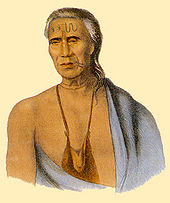Walking Purchase
Walking Purchase is a contract that was signed in 1737 between William Penn's son Thomas and Lenni Lenape .
William Penn, the founder of Pennsylvania and a devout Quaker , was known for treating the Indians fairly. In contrast to the other colonies, therefore, the relationship between colonists and Indians in Pennsylvania was trusting. By 1737, William Penn had been dead for nearly 20 years and his son Thomas, heir and landowner, had to sell land to pay off his family's debts. The land he wanted to sell was on the upper reaches of the Delaware River , the residential area of the Lenni Lenape. Penn produced an old but unsigned document from 1686 and convinced Chief Lappawinsoe that it was a legally binding deed of sale for the mentioned area. The Indians accepted the treaty, believing it would be an insignificant adjustment of borders. The deed gave the Penn family as much land as a man can walk around in a day and a half without further defining the route.
Government official James Logan had a clever plan and cleared the way for the three fastest runners in the colony of loggers. Early on September 19, 1737, Edward Marshall, Solomon Jennings and James Yeates began their run and ran all day and night without a break. Two of the three runners gave up, exhausted, but the third covered a distance of 113 km in a day and a half.
The Penns ownership claim finally comprised 4,860 km² in what is now northeastern Pennsylvania, which is almost twice the size of the Saarland . The contract cost Lenni Lenape their entire land and the Minisink were also expropriated. When the Lenape protested against this apparent fraud and tried to cancel the contract, they were expelled by the Iroquois at the request of the colonists . Without owning land, they had to move further west to the upper Susquehanna River .
Individual evidence
literature
- Alvin M. Josephy Jr.: 500 Nations. Frederking & Thaler GmbH, Munich 1996. ISBN 3-89405-356-9
- Alvin M. Josephy Jr.: The world of the Indians. Frederking & Thaler GmbH, Munich 1994. ISBN 3-89405-331-3

